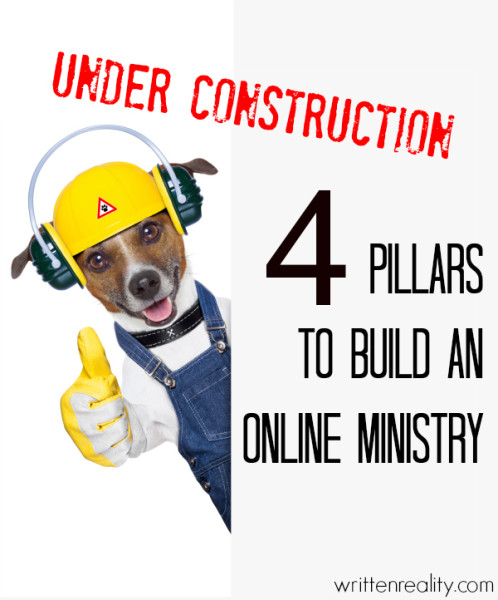You want to share your message. You are ready to build an online ministry. But where to start?
In today’s world, it begins with an online presence–first by claiming your own online real estate and then by connecting your online ministry across other communities. Your digital home is vital to connecting with readers and extending your reach. Just as with any other, to build an online ministry takes plenty of prayer, planning, and a strong framework before you ever start.
There are 4 fundamental pillars to build an online ministry.
Though many marketers claim one is “king” or more important than another, all 4 components deserve equal attention to create a balanced framework–one that is strong enough to support the needs of your readers, and manageable enough to support your own.
4 Pillars to Build an Online Ministry
#1 Message
As writers, our message consumes us. It’s the pillar we’re most passionate about and the reason we’re attempting to do the work. However, passion can become an obsession where we’re so driven we fail to recognize its potential for reaching everyone else.
How does your content satisfy the needs of your reader?
Are you sharing content in a way that ignites your audience and drives them to change?
To build an online ministry first requires finding a gap and filling it in an innovative way. Readers are on the lookout for different. And that’s the best news yet. Why?
Because you are different.
Your perspective, experiences, and skills can offer a fresh take on an old idea or an easier way to solve a common problem your readers face.
It’s not enough to simply enjoy your topic–that’s called a hobby.
Your message becomes a profession when you
–offer something different from anyone else
–solve problems no one else can
Look for the problems and solve them. Find areas where your reader gets confused and find an easier way to help them understand.
[Tweet “Become an expert on your content. Master your message to claim your space. via @MitziCSmith”]
#2 Image
How you package your content is just as important as the message. As you begin to build an online ministry, think about the design of your website.
Is your online space engaging? user-friendly? suitable for your content?
A well-designed online space provides clarity, consistency, and an experience readers will want to repeat.
When designing your website, create an environment that best conveys your message, is simple to read, and easy to distinguish across all social networks.
#3 Plan
Once you’ve determined the focus of your content and designed your space to define it, your next fundamental pillar will be your plan. How will you communicate with your audience on a daily basis?
Will you create blog posts? video tutorials? a series of infographics or charts?
Your online ministry strategy should include:
-a social network plan
-blog posting schedule
-time for engaging on other sites through comments, guest posting, and/or link-ups
And let’s not forget–time to actually write!
Though the plan pillar may seem overwhelming, your online strategy will soon become second nature and a priceless tool to discover online trends, readers’ needs, and ways you can improve your content and site.
A well-organized plan will determine the success of your platform.
Take a step back and create a long-term plan that best suits your writing practices and the goal you are trying to reach.
#4 Toolbox
Once you have determined your focus, defined your image, and designed a plan, how will you execute the process?
The online world is a loud and crowded place. Without using the latest technology, your online ministry will sink. That’s why the toolbox pillar can be your greatest asset.
Though the toolbox pillar is essential, it’s usually the component that’s most ignored.
The professional quality of your online ministry will be determined by how well you use the tools in your toolbox.
I’ve never considered myself as techno-savvy or a computer geek. However, I knew I was created to write the words and share them. I wasn’t about to let my lack of computer knowledge keep me from pursuing my purpose and extending my reach.
I read books, watched videos, and listened to podcasts. Through the process, I not only learned how to improve my online presence, but found a passion for technology that has enhanced my writing skills and motivated me to think outside the box.
These tools will broaden the scope of your audience and help you create your content more efficiently.
Online tools such as blog plug-ins, recording software, and even music downloads will set your space apart as a user-friendly, inviting space.
Are you ready to use the 4 Pillars to build your online ministry?
Though building an online presence requires time, lots of work, and plenty of patience, it is your greatest opportunity to extend your reach and change the world.
What about you?
What do you think is essential to build an online ministry? Share you comments with us.











Leave a Reply